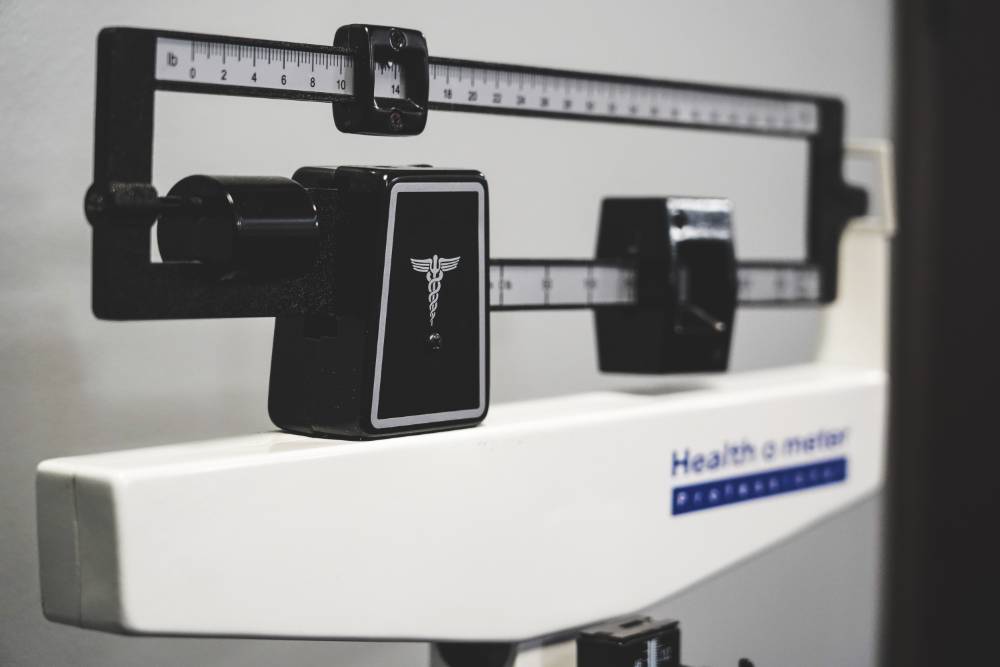I’ve noticed through the years that social media diet gurus like to target postpartum and menopausal women for their products, and that’s a pet peeve of mine. I don’t like it because we women are vulnerable at these stages of life, and we aren’t broken in either of these stages, we often need to just re-evaluate some of our lifestyle choices and make some changes. It’s never one thing, a handful of miracle foods or a special diet that’s going to “fix” the situation. It’s not due a slow, sluggish, or broken metabolism either.
First, a quick synopsis of what the metabolism is. Metabolism is nothing more than the chemical reaction process by which a body converts calories into energy and storage if there is an excess. All day long our bodies take in oxygen and get rid of carbons in the form of carbon dioxide. This is affected by what we do with our bodies both through the years and daily.
Gaining and losing fat can change the way your brain regulates your body weight. Body composition- what a body is made of, plays a big part. This is the level of lean tissue (muscle, connective tissue, bones, organs, etc) to fat ratio. Every decade muscle mass is lost IF diet and exercise isn’t supporting muscle growth and maintenance. Stats vary but approximately 3 to 8 percent per decade after the age of 30, increasing the rate of decline after age 60. So, its apparent to deduce that since many women give birth in their 30’s, and many don’t lift weights with enough stimulus through the busy decade or two into menopause that body composition is a huge factor.
When we talk about diet and how it affects metabolism, and body composition there are a couple important points to recognize. First, all foods aren’t created equal when it comes to the energic costs to digestion. Foods like lean proteins have a higher energetic cost, or higher thermic effect than foods like prepared, processed items. Also, how foods are eaten can make a difference. for example, eating fat with fibre and protein can carry some of the fat back out during elimination. The harder the body must work to digest, the greater the energetic cost.
Gut health will also affect energy absorption as well as absorption of micronutrients important to health.
The amount of energy we use in a day is greatly affected by our resting metabolic rate. 60 percent of our daily calories are used in breathing and daily living tasks. This is known as your resting metabolic rate and that depends on your body weight, body composition, sex, age, genetics, gut health, medications, etc. many of these factors can be manipulated by specific types of exercise, dietary choices, medications recovery principles like sleep and meditation practices. So, it can be said that resting metabolic rate (and metabolism in general) is greatly influenced by lifestyle choices.
In other words, your energy output greatly affects your metabolism ( metabolism is the thing that gets vilified and is the word used to manipulate consumers by marketers, like its inherent to us and can’t be changed) When in fact, all your metabolism really is, is the product of your resting metabolic rate plus the thermal effect (or lack of) of the foods you eat, plus purposeful activity ( specific to types that add muscle mass and improve aerobic and threshold cardiovascular rates) plus non purposeful exercise activity thermogenesis (neat, or general movement throughout the day) So, you can see that there are many, many factors that we can manipulate ( a few that we can’t like genetics) but the ones we can change greatly outnumber, and are in my list below, for things you can do that will improve your internal environment to lose and maintain your weight for life!
- Be smart with your purposeful exercise. As you can see from the above, its body composition that is a great factor in metabolism. Start with a foundation of strength and then lift weights with enough stimulus and volume to add muscle mass. Due to daily living, pregnancy, injury, stressful events, etc. just putting on the sneakers and getting after it in the gym is often not enough. Details like rib cage and pelvic alignment, breathing and core engagement, congruency of joints during exercises, foot and gait mechanics will all influence the quality of exercise. So does exercise selection, loading, rest breaks and recovery. learning the skill of lifting before jumping in will improve the results, and when done with consistency will add muscle mass which improves body composition. Recommendations are 3 hours a week, but I have many time crunched clients who see great results doing 2x a week. Remember that an efficient body is good at taking in oxygen and getting rid of carbons. Improve the aerobic system by doing cardiovascular work that keeps your heart rate up in a range that makes it difficult for you to say more than a sentence at a time, that is zone 2 to zone 3 heart rate zone- staying here for extended periods. Adding 10 minutes onto lifting weights at the end of a session or adding in 2 or 3-, 20- or 30-minute bouts per week is very effective. I always hesitate to be prescriptive with amounts because its far more important to be consistent from week to week than it is to try to do a lot and then fall back or quit. A fitter body is one that can do a lot of work, that is, take in more oxygen and turn over more energy in a day.
- Eat more whole foods to limit processed and less nutritious choices. Eating higher quality foods like lean proteins, limiting saturated fat for inclusion of mono-unsaturated fats like avocadoes and almonds, including fatty fish like salmon into the diet. Fats do a lot for the immune system. They also suppress inflammation, support our hormones, are important for brain and heart health and make food more palatable. The key is energy intake (both starch carbs and fats are sources of energy) and consuming enough unsaturated fats. The closer a food is to its natural state, the higher the thermal effect, the greater the energetic cost to the body. Therefore, plate lean protein first then non starch vegetables, then enough starch carbs and fats to fuel your activity level.
- Develop a sleep routine. A rested body will perform better. Reserve the hour before bed for quiet activities that don’t include a screen. Try to have a bedtime and wake time that stay consistent. Increase time spent in bed until the alarm clock isn’t needed for wake up. Keep the blinds up so that natural light wakes you. Sleep disturbances are very common in postpartum and menopausal periods, but these are affected greatly by hormonal changes which can be positively affected by exercise, diet and stress management, no system in the body works alone. It takes time, patience, and changes in all areas of lifestyle to improve the hormones that get blamed for weight gain during these life events.
- Have patience. If you do happen to want to lose some weight before you get into maintain, do it slowly. Go for a minimal caloric deficit and know your ratios of protein, complex carbs, and fats to start. Track data so that you can change amounts of carbs and fats to suit to lose and eat enough protein. It is essential to eat a bare minimum of 1g per pound of lean body weight. More if you want to gain muscle, and our protein needs increase as we age. It is the consumption of enough protein daily in the amounts (a minimum of 20 to 30g at a time), and progressive weight training that make positive changes to the metabolism. As a person loses weight, their caloric intake needs decrease. Its important to focus on body composition changes instead to preserve muscle mass during loss as well as not to end up having to go very low in calories to see weight loss happen. This leaves one with more options to create the caloric deficit needed to continue to see weight loss. Think in terms of months for a commitment, not weeks.
- Consider some supplementation. Eating enough lean protein, eating a minimum of 5 servings of non -starch vegetables a day, eating from the rainbow of vegetable and fruit choices, staying with minimally processed and quality starch carbs in the amounts that match your activity level, and minimizing saturated fats to also get in unsaturated fats goes a long way to improve health but supplementation can also be beneficial. ALWAYS CONSULT YOUR DOCTOR FOR WHAT IS BEST FOR YOU. Here are a few of the supplements that I take and why, as an active 57-year-old woman with no health issues. Omega-3 fish oil. I take the liquid form with higher DHA. Researched findings that higher dha protects against Alzheimer’s and dementia. Omegas have also been cited as protection against heart disease, stroke, and diabetes. Vitamin D- its needed to build and maintain healthy bones, its needed for calcium absorption, and it regulates other cellular functions like cell growth, immune function, and glucose metabolism. Magnesium- it’s a common deficiency which supports muscle and nerve function and energy production. being low in it can be a factor in high blood pressure, heart disease, diabetes, and osteoporosis. I eat many foods like spinach, avocadoes, pumpkin seeds and black beans regularly, but magnesium supplementation also helps with better sleep as in faster falling asleep and staying asleep through the night. Greens and protein powder. For my personal factors and goals, I need a minimum of 160 grams of protein per day. I find that using both a protein powder as well as collagen helps me to keep up those numbers while providing me with support for connective tissue development. as we age, our connective tissue and skin can lose elasticity, strength, and function. Supplementation can’t save a person from their lifestyle choices. Alcohol use, over exposure to environmental exposure, insufficient sleep. lack of exercise, smoking and too much exposure to sun without protection can all decrease collagen production. Greens are a great way to increase energy but are not an elixir against poor lifestyle choices. Probiotic- Gut health is very important to every other system in the body. It’s said that we have two brains, one in our head and the enteric nervous system that regulates our gut. Both the brain and gut are connected in a variety of ways. If the microbiome of the gut is poor, it will affect brain function, nerve function, immune function, inflammation control, mood, even cognitive disorders like Alzheimer’s and dementia. It’s not probiotics alone that improve gut health but looking at gut health as a whole is very important to the health of the entire body. Whichever supplements you choose to take, you should always be considering how you are getting these through natural sources first. Supplements are meant to enhance; they are not the fix for less healthy lifestyle choices.
- Hydration. Your body is made up of 60 percent water. we need to take in water for protein synthesis to rebuild tissue, to create glycogen for energy, basically to grow and repair the body which is what is happening all day, every day of your life. It also serves as a lubricator and shock absorber. Dehydration can be responsible for physical aches and pains. It regulates body temperature and is a catalyst for metabolic reactions. It is also a source of minerals for remineralization, so it’s important for bone health. It also acts as both a solvent and a transporter for cell processes that happen in our body. Without it our DNA cannot function, our enzymes cannot do their jobs. In short, we just don’t function well without appropriate amounts. The higher the metabolic rate (remember things like your size and activity level) the more water you need. As a base measurement, for every kg of body weight, you need 40ml of water. This goes up for activity levels and is also affected by amounts of foods eaten that contain water, so there is a simpler way to tell whether you are getting in enough water. That is, monitor your urine colour. In the morning there will be a light-yellow colour to your urine. If you stay hydrated through the day, your trips to the bathroom should be frequent and your colour should be very light to non -existent clear. Anywhere from about 8 to 12 cups a day is also a standard recommendation, and it’s better to sip throughout the day rather than gulp. Also, if you have a thirst that cannot be quenched, it’s not water that is needed, rather electrolyte balance. as an aside, muscle cramping can also be caused by lack of potassium, calcium, magnesium and/ or sodium. With so much attention to a low sodium diet in media it’s important to know that getting enough sodium is important for cell function.
So, as you can now see, maintaining weight and bettering health in general is not a quick fix. It isn’t just taking a “superfood “or moving more and eating less to make improvements. Or following a “menopausal fix” diet that swears that eating more fat is the answer. Or doing high intensity interval exercise to burn off the baby fat. The metabolism is made up of who you are, how you live, how you have lived. The daily choices you make over time. It takes time, consistency, and addressing each component of lifestyle from exercise to nutrition to sleep to social connections that make us what we are and creating change in those components and living that way as a lifestyle that will bring and maintain the highest quality of life, to life.




